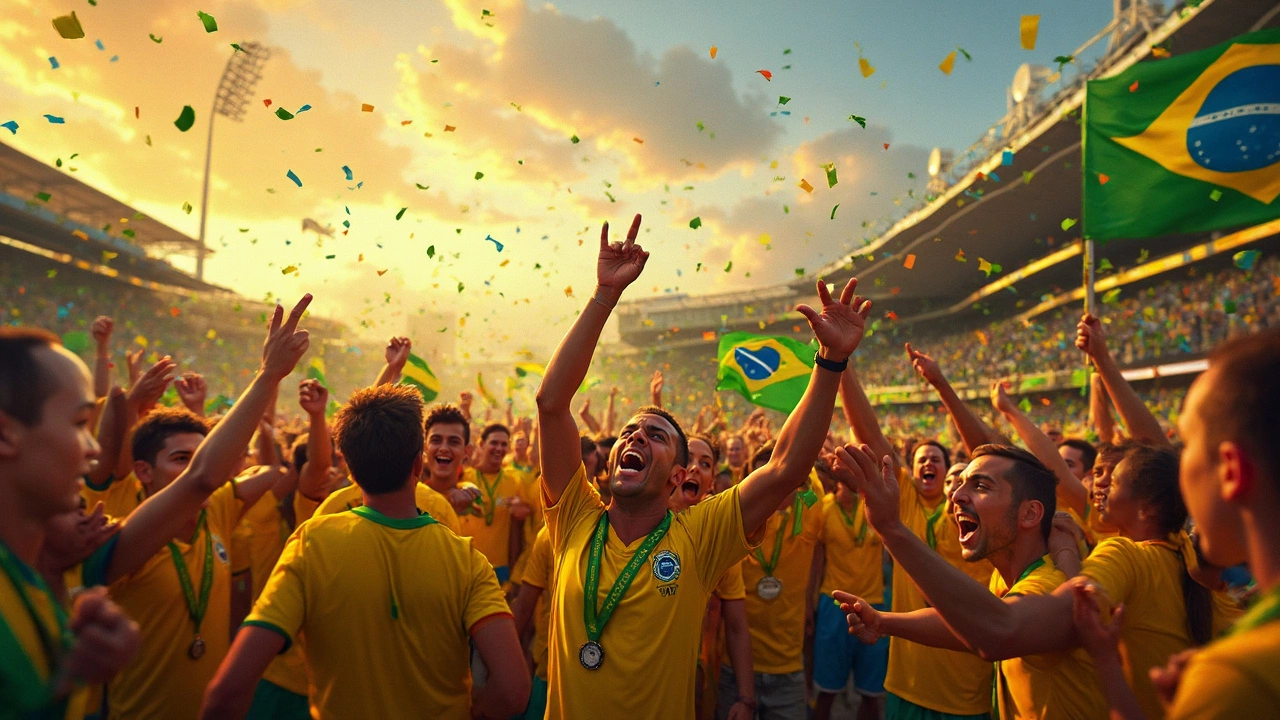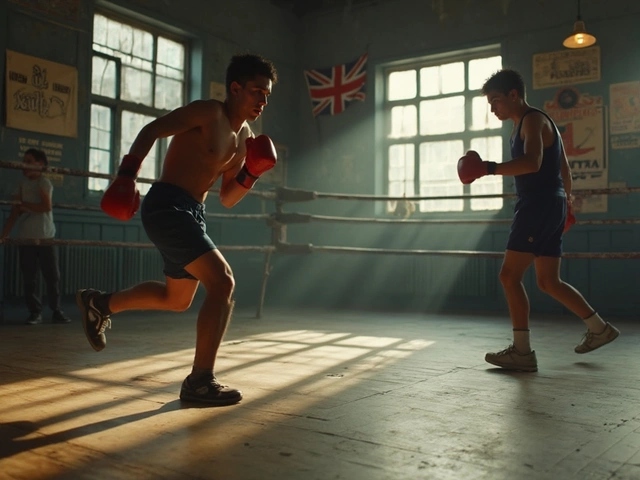How Many World Cups Has Brazil Won?

When we talk about football giants, Brazil is always at the forefront. And why wouldn't it be? This nation, passionate about the sport, has clinched the FIFA World Cup a whopping five times! That's more than any other nation, proving their dominance and skill on the global stage.
So, when did these victories happen? Brazil first tasted World Cup glory in 1958, with a dynamic team that changed the game forever. Then they did it again in 1962 and just over a decade later in 1970. The magic continued in the 90s, with wins in 1994 and 2002. Each victory was a showcase of talent, determination, and some pretty amazing football!
We'll dive deeper into each of these wins throughout this article, exploring the legendary players who made it happen and the unforgettable moments that are still talked about today. Whether you're a die-hard Brazil fan or just love the game, there's plenty to unpack and enjoy. So, stick around as we journey through Brazil's illustrious World Cup history!
- Introduction to Brazil's World Cup Success
- The Historic Wins and Milestones
- Legendary Players Contributing to Victories
- Iconic Matches and Moments
- Influence on Global Football Culture
- Lessons from Brazil's Strategies
Introduction to Brazil's World Cup Success
Brazil's journey in the World Cup spotlight began with a bang. They hold the record for most wins, establishing themselves as a powerhouse on the football field. Their track to greatness wasn't just about the victories; it was about how they played the game. With flair, style, and an unparalleled level of skill, Brazil changed how the world viewed football.
Their first win in 1958 marked not just a triumph but a revolution in the sport. Brazil introduced a unique playing style, often described as 'samba football,' that combined swift footwork, strategic teamwork, and pure artistry. This was the beginning of a footballing culture that influenced generations worldwide.
Breakthrough Moments
But Brazil's success wasn't instantaneous. Before clinching their first title, the team faced challenges on the international stage, like their near miss in 1950 when they ended up as runners-up. This set the stage for a motivation-fueled team hungry for future glory.Since then, Brazil bagged World Cups in 1962, 1970, 1994, and 2002. Each win further cemented their reputation as world champions and brought forth legendary players like Pelé and Zico, who aren't just famous in Brazil but beloved globally for their contributions to the sport.
Building the Legacy
Brazil's strategy focused on nurturing homegrown talent. Football isn’t just a game there—it's a way of life, as evident in their commitment to developing skills from a young age. Schools, local clubs, and even street games have been breeding grounds for future stars.This dedication pushed Brazil to consistently top the FIFA rankings and remain a formidable team in every tournament they enter. Their success isn’t just measured by trophies but by the lasting impact on playing styles worldwide.
The Historic Wins and Milestones
When it comes to Brazil World Cup wins, each victory was nothing short of a milestone in football history. The country's first triumph in 1958 marked the beginning of an era. Led by the legendary Pelé, still in his teenage years, Brazil beat Sweden 5-2 in the final. They played with a style that amazed everyone and set the standard for the exciting football we love today.
Fast forward to 1962, and Brazil did it again, holding on to their title with a nail-biting win over Czechoslovakia. The team was resilient, showing great depth even without an injured Pelé for much of the tournament. It was a true team effort that brought them their second consecutive title.
The 1970 victory was perhaps Brazil's most celebrated. That team, often considered one of the best in history, featured Pelé, Jairzinho, Tostão, and Rivelino. They played an almost artistic brand of football that culminated in a 4-1 triumph over Italy. The world saw a new standard of excellence, with tactics and flair that have been studied ever since.
Into the Modern Era
After a 24-year wait, Brazil captured the title again in 1994. It was a tense final against Italy, ending in a penalty shootout—the first World Cup final to be decided this way. Roberto Baggio's famous miss symbolized Brazil's return to glory.
The 2002 World Cup in South Korea and Japan was another masterclass. Brazil's team, led by stars like Ronaldo, Rivaldo, and Ronaldinho, went undefeated through the tournament. They beat Germany 2-0 in the final, with Ronaldo showing brilliance by scoring both goals.
Brazil's World Cup Record
| Year | Opponent | Score |
|---|---|---|
| 1958 | Sweden | 5-2 |
| 1962 | Czechoslovakia | 3-1 |
| 1970 | Italy | 4-1 |
| 1994 | Italy | 0-0 (3-2 penalties) |
| 2002 | Germany | 2-0 |
These triumphs not only highlight Brazil's success but also their profound influence on the global football culture. Each win was a milestone, rich with stories and lessons that have inspired fans and players around the world. Brazil's World Cup journey is a story of passion, flair, and unrivaled football mastery.
Legendary Players Contributing to Victories
When it comes to Brazil World Cup wins, the magic on the field owes much to its legendary players. These football maestros not only shaped Brazil’s victories but also left an indelible mark on the game's history worldwide.
Pele - The Football King
No conversation about Brazilian football is complete without mentioning Pele. He burst onto the scene as a 17-year-old wonder kid in 1958, dazzling the world with his skills and scoring crucial goals that led Brazil to its first World Cup win. Pele's influence was not just on scoring; his creativity and vision made him a crucial part of Brazil's subsequent successes in 1962 and 1970 as well.
Garrincha - The Joy of the People
Then there's Garrincha, the dribbling genius who was pivotal in both the 1958 and 1962 World Cup campaigns. Known for his flair and ability to mesmerize defenders, Garrincha is still celebrated for his unique style of play, and his contributions are considered just as important as Pele’s in those early victories.
Ronaldo - The Phenomenon
Fast forward to the 90s and early 2000s, and you have Ronaldo, also known as 'The Phenomenon'. His extraordinary pace and goal-scoring prowess were key in Brazil lifting the trophy in 2002. Ronaldo’s remarkable comeback after serious injury was an inspiring tale of resilience, and his eight goals in the 2002 tournament cemented his legend status.
Zico, Romário, and the 90's Stars
In the 1994 campaign, Brazil's strength lay in a fortified squad with stars like Zico and Romário. Romário, with his cunning and precision, was instrumental in Brazil capturing the World Cup that year, scoring five critical goals and leading the attack line.
All these players have played pivotal roles not just in the Brazil victories but also in pushing the boundaries of what football can be. Their legacy continues to inspire new generations of players and fans alike, keeping Brazil at the heart of global football culture.
Iconic Matches and Moments
Brazil's incredible journey through their World Cup wins is filled with epic matches and unforgettable moments that have left a lasting mark on football history. Let's dive into some of these highlights.
The 1958 Final: A Star is Born
The 1958 World Cup final in Sweden was a momentous occasion for Brazil. They faced Sweden in a decisive match and won 5-2, but what really stood out was the performance of a 17-year-old prodigy, Pelé. His two goals not only sealed the victory but also announced his arrival on the world stage. It's not every day you see such a young player perform with that level of finesse and confidence. Some even said, "
I've never felt such responsibility but when I saw the joy on my father's face, I knew it was all worth it." Those words capture the joy and pride that victory brought to an entire nation.
Mexico 1970: The Beautiful Game Perfected
Fast forward to 1970 in Mexico, and Brazil showcased what many still refer to as the best team in World Cup history. Their final match against Italy ended in a resounding 4-1 victory, with goals by Pelé, Gerson, Jairzinho, and Carlos Alberto. That last goal, often called the perfect team goal, exemplified the very essence of "The Beautiful Game." Every pass was precise, and every touch was magical.
USA 1994: The Tense Penalty Shootout
In 1994, Brazil claimed their fourth World Cup title in a nerve-wracking final against Italy. After a 0-0 draw, the match went to a penalty shootout. The drama unfolded in front of a massive crowd, and the tension was palpable. Brazil's goalkeeper, Taffarel, became a national hero after his remarkable saves, and the moment Roberto Baggio shot over the bar was etched into World Cup lore, gifting Brazil the title.
South Korea/Japan 2002: The Masterclass
The 2002 World Cup in South Korea and Japan saw another extraordinary team performance by Brazil. They faced Germany in the final and secured a comfortable 2-0 win with Ronaldo scoring both goals. That victory not only gave Ronaldo the redemption he sought after the heartbreak of 1998 but also solidified Brazil's record fifth World Cup win. However, it wasn't just about the individual brilliance; it was a masterclass in teamwork, preparation, and execution.
Brazil's journey through these iconic matches and moments reflects their undeniable skill and deep love for football, consistently reminding us why they are one of the sport's biggest legends.
Influence on Global Football Culture
Brazil has not just won World Cups; the country has reshaped global football culture in countless ways. With their unique style and flair, they've set standards that inspire players and fans worldwide. Just think of Samba football—a style characterized by creativity, agility, and a free-spirited approach. It's not just a way to play; it's a reflection of Brazil's vibrant culture and way of life.
Joga Bonito: The Beautiful Game
The phrase "Joga Bonito", which translates to "The Beautiful Game," is often associated with Brazil. This nation turned football into an art form. Players like Pelé, Zico, and Ronaldo have shown that football is not only a sport but also a performance. They've inspired generations of athletes, emphasizing style as much as substance.
Global Football Icons
Brazilian players have been trailblazers in shaping global concepts of football excellence. Their success in various international clubs has spread Brazilian football culture far beyond its borders. Icons like Ronaldinho and Neymar are not just players but fashion and cultural symbols, often fronting campaigns that merge sports with lifestyle.
Impact on Youth Development
The country’s influence extends to youth development programs worldwide. Many football academies have adopted Brazilian methods, focusing on individual skill and creativity. This has transformed how young talents are nurtured, making the game more accessible and exciting.
FIFA World Cup and Beyond
When Brazil hosts tournaments, like the 2014 FIFA World Cup, they not only spotlight global sporting excellence but also showcase their rich culture to the world. The 2014 event was more than a series of football matches; it was a celebration of global unity, passion, and cultural exchange.
Cultural Celebrations and Fans
Brazilian fans are another significant cultural export. Their passion, energy, and colorful celebrations have become a staple at international matches. Whether it's their music, dance, or just infectious enthusiasm, Brazilian supporters bring a unique atmosphere to every game they attend.
In short, Brazil doesn’t just play football; they elevate it, leaving a lasting legacy on global football history and culture. Their influence is visible in every corner of the football world, and their contribution continues to shape the game's future.
Lessons from Brazil's Strategies
When it comes to winning the Brazil World Cup, Brazil has got a playbook that other teams can only dream of. Let's unwrap some of their brilliant strategies that have paved the way for their success on the world stage.
Emphasizing Skill and Creativity
Brazil's approach has always focused on skill and creativity. Unlike many teams that rely heavily on physical play, Brazil encourages players to express themselves. This freedom has allowed legends like Pelé, Zico, and Ronaldinho to shine.
Strong Youth Development
You can't talk about Brazil's victories without mentioning their investment in youth. The country boasts a vast network of youth academies where budding talent is nurtured. Players are groomed from an early age, ensuring a steady pipeline of skilled footballers into the national team.
Flexible Tactics
Brazilian teams have gained notoriety for adapting tactics to different opponents. Instead of sticking to a rigid formation, they are versatile, making in-game changes that confuse opponents. This tactical flexibility makes them a formidable force on the field.
Team Chemistry and Cohesion
Brazil always plays as a unit. The chemistry within the team translates into seamless teamwork. You'll often hear stories about how their players connect off the field, fostering a sense of family and unity that's apparent during matches.
Capitalizing on Global Talent
Brazil has an uncanny ability to scout and incorporate players who compete in various international leagues. This exposure to different styles of play makes Brazilian players adaptable and broadens their strategic options.
| World Cup Wins | Years |
|---|---|
| First Win | 1958 |
| Consecutive Wins | 1958, 1962 |
| Third Win | 1970 |
| Fourth Win | 1994 |
| Last Win | 2002 |
These key strategies and their execution have set Brazil apart, contributing to their five-time World Cup victories. Understanding these elements can be a game-changer for teams looking to replicate Brazil's success in their own playbooks.




